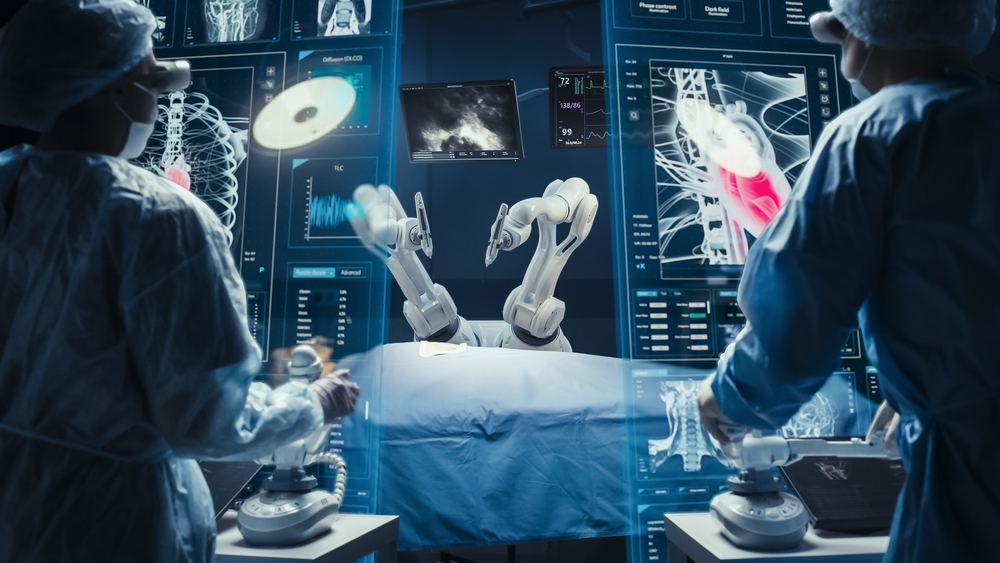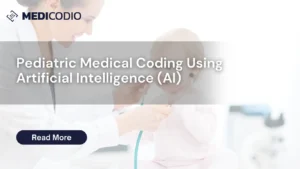Are you a healthcare professional or administrator wondering how Artificial Intelligence is changing your field? The impact of Artificial Intelligence in Healthcare is transforming every aspect of medical practice, from diagnosis to treatment and patient management.
Artificial Intelligence in Healthcare encompasses a range of applications, including advanced data analysis, predictive analytics, personalized medicine, and robotic surgeries. These innovations not only improve patient outcomes but also increase the efficiency and effectiveness of healthcare services. MediCodio is at the forefront of this transformation with its AI-based CODIO app, designed to simplify and enhance medical coding accuracy.
This blog will explore six groundbreaking applications of Artificial Intelligence in Healthcare, demonstrating how these technologies are reshaping the industry. Whether you are a healthcare professional, administrator, or someone interested in the future of healthcare, understanding these applications will provide insight into the incredible potential of AI to innovate and heal. Stay tuned to learn more about how AI is setting new standards in healthcare and how MediCodio is leading the way with its cutting-edge solutions.
Enhanced Diagnostic Accuracy
How AI Algorithms Improve Diagnostic Accuracy
Artificial Intelligence in Healthcare is making significant strides in improving diagnostic accuracy. Here’s how AI algorithms are transforming diagnostics:
- Image Recognition: AI algorithms can analyze medical images such as X-rays, MRIs, and CT scans with incredible precision. They detect patterns and anomalies that might be missed by the human eye.
- Data Analysis: AI can process vast amounts of medical data quickly. By comparing new data with historical records, AI identifies trends and makes accurate predictions.
Example of AI in Radiology and Pathology

Artificial Intelligence in Healthcare is particularly impactful in radiology and pathology:
- Radiology: AI systems analyze radiological images to detect fractures, tumors, and other conditions. This reduces human error and speeds up diagnosis, ensuring patients receive timely treatment.
- Pathology: AI helps pathologists by analyzing tissue samples and identifying cancerous cells more accurately. This leads to better treatment plans and improved patient outcomes.
By leveraging AI technology, you can enhance diagnostic accuracy, reduce errors, and improve patient care. Embracing Artificial Intelligence in Healthcare means staying at the forefront of medical innovation and delivering the best possible outcomes for your patients.
Predictive Analytics for Patient Care
How AI Predicts Patient Health Trends and Outcomes
Artificial Intelligence in Healthcare is revolutionizing the way you predict patient health trends and outcomes. Here’s how AI uses data to make accurate predictions:
- Historical Data Analysis: AI algorithms analyze past medical records to identify patterns and predict future health issues.
- Real-Time Data Monitoring: By continuously monitoring current patient data, AI can detect early signs of potential health problems.
AI for Preventive Measures and Personalized Treatment Plans
Artificial Intelligence in Healthcare is not just about treating illnesses but also about preventing them. Here’s how AI helps in preventive care and personalized treatments:
- Preventive Measures: AI identifies patients at risk of developing certain conditions and suggests preventive measures. For example, it can alert you if a patient is likely to develop diabetes based on their lifestyle and medical history.
- Personalized Treatment Plans: AI tailors treatment plans to each patient’s unique needs. By analyzing individual data, AI can recommend the most effective treatments and medications.
By using Artificial Intelligence in Healthcare, you can predict health trends, take preventive actions, and create personalized treatment plans. This ensures better patient care and improved health outcomes, keeping you ahead in the medical field.
Robotic Surgery and Precision
The Role of AI in Enhancing Surgical Precision
Artificial Intelligence in Healthcare is playing a crucial role in enhancing surgical precision through robotic surgery. Here’s how AI improves surgical procedures:
- Enhanced Precision: AI-powered robots assist surgeons by providing greater accuracy during operations. They can perform delicate tasks with precision that surpasses human capability.
- Minimized Human Error: AI systems reduce the likelihood of human error by providing real-time data and guidance during surgery.
Benefits of Robotic Surgery
Using Artificial Intelligence in Healthcare, particularly in robotic surgery, offers several significant benefits:
- Reduced Recovery Times: Robotic surgery is often less invasive than traditional methods, leading to shorter recovery times for patients.
- Improved Patient Safety: The precision of AI-assisted robots ensures that surgeries are safer, with fewer complications and lower risk of infection.
- Consistent Performance: AI systems maintain a high level of consistency and reliability during surgeries, ensuring optimal outcomes for patients.
By incorporating Artificial Intelligence in Healthcare, you can enhance surgical precision, minimize errors, and improve overall patient safety and recovery times. Embracing AI in robotic surgery means providing your patients with the best possible care.
Virtual Health Assistants
Function of AI-Powered Virtual Health Assistants
Artificial Intelligence in Healthcare is transforming patient care with AI-powered virtual health assistants. Here’s how these assistants function:
- Pre-Operative Guidance: Virtual health assistants provide patients with essential information before surgery, such as preparation steps and what to expect during the procedure.
- Post-Operative Care: After surgery, these assistants guide patients through their recovery process, offering advice on medication, wound care, and follow-up appointments.
Improving Patient Engagement and Adherence to Treatment Plans
Using Artificial Intelligence in Healthcare, virtual health assistants significantly enhance patient engagement and adherence to treatment plans:
- 24/7 Support: Virtual assistants are available around the clock, answering patients’ questions and providing support whenever needed.
- Personalized Reminders: They send personalized reminders about medication schedules, follow-up appointments, and daily care routines, helping patients stay on track with their treatment plans.
- Interactive Education: These tools educate patients about their conditions and recovery processes, making it easier for them to understand and follow medical advice.
By integrating Artificial Intelligence in Healthcare, you can offer your patients the support of virtual health assistants, improving their engagement and adherence to treatment plans. This leads to better health outcomes and more satisfied patients.
Streamlined Medical Billing and Coding
Revolutionizing Medical Billing and Coding with AI
Artificial Intelligence in Healthcare is revolutionizing medical billing and coding, particularly through tools like MediCodio’s CODIO app. Here’s how AI is transforming this crucial aspect of healthcare:
- Automation of Code Assignment: AI tools automatically assign the correct medical codes to diagnoses and procedures, saving you time and ensuring accuracy.
- Reduction in Billing Errors: By minimizing human involvement in coding, AI significantly reduces billing errors, leading to fewer claim denials and rejections.
- Faster Processing Times: AI speeds up the entire billing and coding process, from code assignment to claim submission, resulting in quicker reimbursements.
Benefits of AI in Medical Billing and Coding
Using Artificial Intelligence in Healthcare, especially in medical billing and coding, offers several key benefits:
- Efficiency: Automated processes mean you spend less time on manual coding and more time on patient care.
- Accuracy: AI tools like CODIO ensure that coding is accurate, reducing the risk of costly mistakes.
- Speed: Faster processing times mean quicker payment cycles, improving cash flow for healthcare providers.
By adopting Artificial Intelligence in Healthcare, you can streamline medical billing and coding, making the process more efficient, accurate, and faster. Embracing tools like MediCodio’s CODIO app means enhancing your practice’s overall productivity and financial health.
Remote Patient Monitoring

Enhancing Remote Patient Monitoring with AI
Artificial Intelligence in Healthcare is enhancing remote patient monitoring by leveraging wearable technology and mobile apps. Here’s how AI improves this process:
- Wearable Technology: Devices like smartwatches and fitness trackers collect continuous health data, such as heart rate, blood pressure, and activity levels.
- Mobile Apps: These apps sync with wearables to provide real-time data and health insights directly to your device.
Real-Time Insights and Timely Interventions
Using Artificial Intelligence in Healthcare for remote patient monitoring offers several benefits:
- Continuous Data Collection: Wearables and apps gather health data 24/7, providing a comprehensive view of a patient’s condition.
- Real-Time Insights: AI analyzes the collected data to give you real-time insights into patient health, identifying any anomalies or trends that need attention.
- Timely Interventions: With continuous monitoring, you can intervene promptly if a patient’s health metrics indicate potential problems, preventing complications and improving outcomes.
By integrating Artificial Intelligence in Healthcare, you can enhance remote patient monitoring, ensuring that patients receive timely care based on real-time data. This proactive approach leads to better patient management and improved health outcomes.
Conclusion
Artificial Intelligence in Healthcare is driving remarkable advancements that enhance diagnostic accuracy, predict patient health trends, improve surgical precision, engage patients through virtual health assistants, streamline medical billing and coding, and enable effective remote patient monitoring. These innovations are not only improving patient outcomes but also increasing the efficiency of healthcare operations.
As AI continues to evolve, the potential for further advancements in healthcare is immense. Embracing these technologies can lead to even greater improvements in patient care and operational efficiency.
Healthcare professionals and RCM leaders, it’s time to embrace AI technologies like MediCodio’s CODIO app. By integrating AI into your practice, you can achieve higher accuracy, faster processing times, and ultimately, better patient care. Embrace the future of healthcare with AI today.
FAQ’s
What are some applications of Artificial Intelligence in Healthcare?
AI is used in diagnostics, patient monitoring, robotic surgery, medical billing, and personalized treatment plans.
How does AI improve diagnostic accuracy in healthcare?
AI algorithms analyze medical images and data, detecting patterns and anomalies that might be missed by humans, leading to more accurate diagnoses.
What benefits does AI offer for medical billing and coding?
AI automates code assignment, reduces billing errors, and speeds up processing times, making the billing and coding process more efficient.
How does AI enhance remote patient monitoring?
AI uses wearable technology and mobile apps to collect continuous health data, providing real-time insights and allowing for timely interventions.
Why should healthcare professionals and RCM leaders embrace AI technologies like MediCodio’s CODIO app?
Embracing AI technologies improves accuracy, efficiency, and patient care, leading to better outcomes and streamlined operations.





